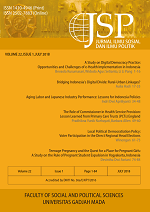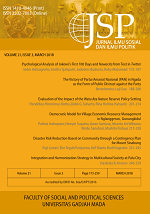Political Behaviour of the Indonesian Middle Class: Lower Turnouts in More Modernised Areas
Dyah Margani Utami(1*), Mohamad Ikhsan(2), Teguh Dartanto(3), Rizal Mallarangeng(4)
(1) Ministry of Agriculture Republic of Indonesia; Graduate Program in Economics, Faculty of Economics and Business, Universitas Indonesia
(2) Department of Economics, Faculty of Economics and Business, Universitas Indonesia
(3) Department of Economics, Faculty of Economics and Business, Universitas Indonesia
(4) Freedom Institute, Indonesia
(*) Corresponding Author
Abstract
The modernisation theory assumes that the larger the middle class, the more likely democracy is supported; for example, there will be more participation in elections, as shown in Western countries. However, there is no clear evidence on whether this trend also appears in developing countries. This study emphasises the association between the proportion of the middle class and the support for democracy in terms of voter turnout. Irrespective of the nature of the elections, we suppose that the modernisation level, proxied by the middle-class share, determines voter turnouts. Using data from Statistics Indonesia (BPS) and the General Election Commission (KPU), we differentiate the voter turnouts in Indonesia's general election in 2019 at the district or city levels by grouping them into modernised and less-modernized regions, i.e., urban versus rural, Java versus outside Java, and western versus eastern regions. This study documented a deviation from the modernisation theory, evidenced by an unclear association between the proportion of the middle class and the voter turnout in the modernised areas. Counterintuitively, there are positive associations in the less modernised areas. The findings also reveal the selective participation among voters, as they showed different participation levels in the types of elections conducted in one day. They were more active in presidential elections than in parliamentary elections. In developing countries like Indonesia, the expansion of the middle class, followed by the declining number of rural regions, may lead to a decline in voter turnouts, thus raising demand for good governance and better performance of parties and candidates.
Keywords
Full Text:
PDFReferences
Aidt, T. S., & Jensen, P. S. (2017). From Open to Secret Ballot: Vote Buying and Modernization. Comparative Political Studies, 50(5), 555–593. https://doi.org/10.1177/0010414016628268
Aspinall, E., & Mietzner, M. (2019). Indonesia’s Democratic Paradox: Competitive Elections amidst Rising Illiberalism. Bulletin of Indonesian Economic Studies, 55(3), 295–317. https://doi.org/10.1080/00074918.2019.1690412
Barozet, E., & Espinoza, V. (2016). Current issues on the political representation of middle classes in Chile. Journal of Politics in Latin America, 8(3), 95–123. https://doi.org/10.1177/1866802x1600800304
Berenschot, W. (2018). The Political Economy of Clientelism : A Comparative Study of Indonesia’s Patronage Democracy. Comparative Political Studies, 51(12), 1563–1593. https://doi.org/10.1177/0010414018758756
Berenschot, W., Capri, W., & Dhian, D. (2021). A quiet revolution? Village head elections and the democratization of rural Indonesia. Critical Asian Studies, 53(1), 126-146. https://doi.org/10.1080/14672715.2021.1871852
Chandra, A. (2016). Pemetaan Sosiologis Perilaku Memilih di Nusa Tenggara Barat. Jurnal Transformative, 2(1), 1–15.
Dartanto, T., Moeis, F. R., & Otsubo, S. (2020). Intragenerational Economic Mobility in Indonesia: A Transition from Poverty to Middle Class in 1993-2014. Bulletin of Indonesian Economic Studies, 56(2), 193–224. https://doi.org/10.1080/00074918.2019.1657795
Degan, A., & Merlo, A. (2017). A Structural Model of Turnout and Voting in Multiple Elections. Journal of the European Economic Association, 9(2), 209–245. https://doi.org/10.1111/j.l542-4774.2010.01013.x
Dermont, C., & Stadelmann-steffen, I. (2018). Who decides ? Characteristics of a Vote and its Influence on the Electorate. Representation Journal of Representative Democracy, 54(4), 391–413. https://doi.org/10.1080/00344893.2018.1550109
Fukuyama, F. (2018). Identity, The Demand for Dignitity and The Politics of Resentment. US MacMillan, New York.
Hanan, D. (2020). Identity Politics in the 2019 Indonesian General Elections: Its Significance and Limitation. JWP (Jurnal Wacana Politik), 5(1), 15. https://doi. org/10.24198/jwp.v5i1.27710
Hsiao, H.-H. M. (2018). Middle Class, Civil Society & Democracy in Asia (1st.ed). Routledge. https://doi.org/10.4324/9781351054263
Kasara, K., & Suryanarayan, P. (2015). When Do the Rich Vote Less Than the Poor and Why? Explaining Turnout Inequality across the World. American Journal of Political Science, 59(3), 613–627. https://doi.org/10.1111/ajps.12134
Kennedy, J. J., Liu, H., & Nagao, H. (2018). Voting and values: Grassroots elections in Rural and Urban China. Politics and Governance, 6(2Authoritarianisminthe21stCentury), 90–102. https://doi.org/10.17645/pag.v6i2.1331
Kotzè, H., & García-Rivero, C. (2018). The Evolution of the Middle Class During Nearly Two Decades of Democracy in South Africa. Politikon, 45(3), 387–407. https://doi.org/10.1080/02589346.2018.1466846
KPU-Bogor. (2015). Perilaku Pemilih Kota Bogor dalam Pemilu Tahun 2014 (Vol. 4, Issue 7).
Lindgren, K. O., Oskarsson, S., & Persson, M. (2019). Enhancing Electoral Equality: Can Education Compensate for Family Background Differences in Voting Participation? American Political Science Review, 113(1), 108–122. https://doi. org/10.1017/S0003055418000746
Mietzner, M. (2019). Indonesia’s electoral system: why it needs reform. New Mandala.
Mujani, S., Liddle, R. W., & Ambardi, K. (2018). Voting Behavior in Indonesia since Democratization. Cambridge University Press. https://doi.org/10.1017/9781108377836
Nadeau, R., Lewis-Beck, M. S., Foucault, M., & Jérôme, B. (2017). Patrimony, class, and participation: French elections (1988-2012). French Politics, 15(1), 106–127. https://doi.org/10.1057/s41253-016-0021-6
Ong, E. (2020). Urban versus rural voters in malaysia: More similarities than differences. Contemporary Southeast Asia, 42(1), 28–57. https://doi.org/10.1355/cs42-1b
Ooi, K. B., Basu Das, S., Chong, T., Cook, M., Lee, C., & Yeo, M. C. M. (2018). The Rise of Middle Classes in Southeast Asia. In The 3rd ASEAN Reader (pp. 84–88). ISEAS-Yusof Ishak Institute. https://doi.org/10.1355/9789814620628-023
Resnick, D. (2015). The Middle Class and Democratic Consolidation in Zambia. Journal of International Development, 27, 693–715. https://doi.org/10.1002/jid.3101
Rosenfeld, B. (2015). Varieties of Middle Class Growth and Democratic Preference Formation (Issue September ). Princeton University.
Schotte, S. (2021). The Anxio us and the Climbers: Ambivalent Attitudes towards Democracy among South Africa’s Middle Class. Journal of Development Studies, 57(3), 465–483. https://doi.org/10.1080/00220388.2020.1802007
Söderlund, P. (2017). Candidate-centred electoral systems and voter turnout. West European Politics, 40(3), 516–533. https://doi.org/10.1080/01402382.2016.1271599
The World Bank. (2019). Aspiring Indonesia— Expanding the Middle Class. In Aspiring Indonesia—Expanding the Middle Class. https://doi.org/10.1596/33237
Virananda, I. G. S., Dartanto, T., & Wijaya, B. D. (2021). Does Money Matter for Electability? Lesson Learned From the 2014 Legislative Election in Indonesia. SAGE Open, 11(4). https://doi.org/10.1177/21582440211054492
Warburton, E., & Aspinall, E. (2019). Explaining indonesia’s democratic regression: Structure, agency and popular opinion. Contemporary Southeast Asia, 41(2), 255–285. https://doi.org/10.1355/cs41-2k
Wilonoyudho, S., Rijanta, R., Keban, Y. T., & Setiawan, B. (2017). Urbanization and regional imbalances in Indonesia. Indonesian Journal of Geography, 49(2), 125–132. https://doi.org/10.22146/ijg.13039
Yusuf, M., Afrizal, A., & Alfiandi, B. (2022). Meta Analisis Studi Kelas Menengah Muslim di Indonesia. Indonesian Journal of Religion and Society, 4(1), 1–16. https:// doi.org/10.36256/ijrs.v4i1.238
Zed, M. (2017). Warisan Penjajahan Belanda Di Indonesia Pasca-Kolonial (Perspektif Perubahan Dan Kesinambungan). Diakronika, 17(1), 90–103.
Article Metrics
Refbacks
- There are currently no refbacks.
Copyright (c) 2024 Jurnal Ilmu Sosial dan Ilmu Politik

This work is licensed under a Creative Commons Attribution-ShareAlike 4.0 International License.






















